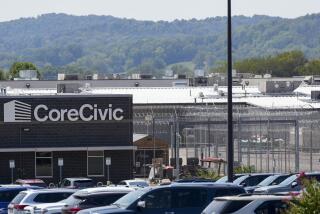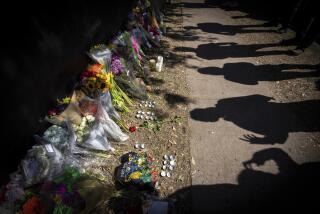Iraqis say they were forced to take Blackwater settlement
- Share via
Reporting from Baghdad — Several victims of a 2007 shooting involving American private security guards employed by the firm formerly known as Blackwater alleged Sunday that they were coerced into reaching settlements, and they demanded that the Iraqi government intervene to have the agreements nullified.
The Iraqis said they were pressured by their own attorneys into accepting what they now believe are inadequate settlements because they were told the company was about to file for bankruptcy, that its chairman was going to be arrested and that the U.S. government was about to confiscate all of the firm’s assets. This would be their last chance to get any compensation, the victims said they were told.
When criminal charges against the guards were dismissed by a U.S. federal judge on Dec. 31, the Iraqis concluded that they had been duped and that Blackwater, now called Xe, was not in the kind of legal and financial trouble they had been led to believe.
“We signed the papers to accept a settlement because we had psychological pressure and some of us were threatened,” Mahdi Abdul Khodr, 45, told reporters Sunday at Iraq’s parliament. He led a delegation comprising representatives of nine of the victims’ families who petitioned Iraqi officials to exert pressure on the U.S. government to nullify the settlements.
Xe confirmed last week that it had reached out-of-court settlements in seven lawsuits filed in the September 2007 shooting in Nisoor Square that killed 17 Iraqis, as well as a string of other incidents in which company guards are alleged to have killed or injured Iraqis. Altogether, the suits covered 45 injured people and the families of 19 slain Iraqis who have all signed settlement agreements, according to court documents.
Civilian deaths
The Nisoor Square shootings were the bloodiest of numerous incidents in which Blackwater contractors are alleged to have fired on civilians, inflaming anti-U.S. sentiments and straining relations between the U.S. and Iraqi governments.
At least 14 civilians were killed and more than 20 injured when the guards opened fire in the busy square.
The charges against five guards accused in the shooting were thrown out on the grounds that the prosecution had built its case wrongly using statements the accused provided under immunity to State Department investigators.
The settlements were reached last fall in meetings at Baghdad’s Rasheed Hotel, where the claimants say they were required to sign a paper, written in English, and make videotaped testimony in Arabic, relinquishing all future claims against the company. Though Xe has not disclosed the settlement amounts, media reports say they averaged between $20,000 and $30,000 for an injury and $100,000 for a death.
Peter White, the lawyer representing Xe in the civil suits, said the company was not present at any of the meetings and “never stated to any victims or their counsel that it would be filing for bankruptcy.” All of the company’s contact with the victims was through the plaintiffs’ own lawyers, he said.
Susan Burke, the lawyer who represented the Iraqis in the civil case filed in Virginia, refused to comment Sunday, citing confidentiality agreements included as part of the settlements. She withdrew the civil suits last week.
After meeting with lawmakers, three members of the delegation described in separate interviews how they were summoned to the hotel and urged by their lawyers to accept the payouts. Burke was not at the meetings.
Fawzia Sharif, 53, whose husband, Ali Khalil, was among those killed at Nisoor Square, said Sunday that three Iraqi lawyers and one American attorney tried to persuade her to accept a settlement. She would not disclose the amount, but said it did not exceed the reported figures.
“At the beginning I refused,” Sharif said. “They spent three hours sitting with us and beseeching us to sign. They planted despair in our hearts, saying they are going to announce bankruptcy and the government is going to confiscate all their assets and you will not get any amount at all if you do not sign.”
“I feel I was deceived by them,” she said. “They told me the company is going to go bankrupt and this was my last chance. But now I wonder, how could this happen to such a big company?”
Feeling coerced
Khodr, the head of the delegation, lost his left eye in the shooting and spent three months in the hospital. He said he accepted a $10,000 settlement because “they told me Blackwater was about to go into bankruptcy, that their manager will be sent to prison and the government will confiscate all their assets.”
“I signed because I had financial difficulties and I needed the money,” said Sami Hawas, 45, a former taxi driver who accepted $30,000. He also lost an eye, walks with difficulty because of leg injuries and hasn’t worked since the shooting. “We don’t know English and we don’t know legal things. But now I think about it, it is not the amount I deserved.”
Not all those who settled are unhappy. Hassan Jabar Salman, an attorney who suffered injuries to his back, shoulder and arm, said in a telephone interview Sunday that he received significantly more than the amounts being reported and that he is satisfied. Because he is a lawyer, he said, “I know how to negotiate.”
An October ruling by a federal judge in the Virginia case suggests the Iraqis may have faced obstacles had they persisted. The ruling said that the plaintiffs had not demonstrated that the company could be sued in federal court, and it suggested that they refile using different arguments. That could have dragged the case out for several years, legal experts say.
“These lawsuits would not have been a piece of cake,” said Eugene R. Fidell, who teaches military law at Yale Law School. “It would have been a real hassle and who knows what the outcome would be.”
Though there have been no published reports suggesting Xe is in danger of bankruptcy, it is also highly unlikely that any court would dismiss the out-of-court settlements without proof of coercion or fraud, especially as the plaintiffs’ own lawyers were present when they signed, said Robert Strassfeld, director of the Institute for Global Security Law and Policy at Case Western Reserve University School of Law.
He described the amounts involved in the settlements as “disappointing,” but added, “I was fairly pessimistic about the likelihood of ever achieving justice in this case.”
A separate civil suit filed by several other victims of the Nisoor Square shootings is pending in a North Carolina court.
Times staff writer Raheem Salman contributed to this report.
More to Read
Sign up for Essential California
The most important California stories and recommendations in your inbox every morning.
You may occasionally receive promotional content from the Los Angeles Times.










